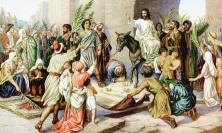
What are we to make of Jesus’s seemingly stern warning that: ‘unless you repent, you will all perish as they did’? Jack Mahoney SJ examines the meaning of this caution that we will hear in Sunday’s gospel, which only Saint Luke records. Far from issuing a threat to his hearers, Jesus was speaking of the wealth of God’s love and patience, and encouraging us to respond in whatever way we can.
The last two Sunday Gospels have described dramatic events in the life of Jesus which the Church has provided for our Lenten reflection – his temptation in the desert by the devil and his Transfiguration during a night of prayer to his Father on a mountain top – and forthcoming Sundays in Lent will contain further events from Jesus’s life for us to think and pray about. This Sunday, however, the gospel reading taken from Luke 13:1-9 recounts to us Jesus’s exhortation that we need to ‘repent or perish,’ with a parable to illustrate this. Perhaps the Church considers that as we are now well into Lent, beginning the third week, this is a good time to come straight to the point and have Jesus give us a strong hint that if we haven’t already done something about Lent by way of extra prayer and penance and good works, as I discussed in a previous article, then it’s about time we did!
Before it’s too late?
This passage from St Luke’s Gospel, which is not found in any of the other gospels, is included in a large section containing several other warnings that Jesus issues to his hearers. The message behind this particular warning appears to be that: although it’s never too late to ask forgiveness for one’s sins, nevertheless the time is running short when we will be able to do so. Some of those listening to Jesus preaching in Galilee reported how the Roman procurator, Pontius Pilate, had recently sent troops into the Temple in Jerusalem to brutally wipe out a small group of Galilean pilgrims who had gone down to Jerusalem, ‘mingling their blood with their sacrifices’, possibly because they had begun to create a political disturbance or were suspected of being liable to do so in Roman eyes (13:1). Equally shocking, although for a different reason, was the tragedy also reported to Jesus from Jerusalem of eighteen people who had recently been crushed to death when a tower in the city’s old wall near the pool of Siloam had suddenly collapsed on top of them (13:4). Hearing of these calamities, Jesus asked his hearers: why did these dreadful things occur? Was it because the people who lost their lives were terrible sinners, worse than other people? (13:2, 4).
There was a view among Jews, which is not unknown among believers even today, that disasters are a punishment from God for sinful behaviour. After all, God had said to his people in giving them the Ten Commandments that he would punish children for several generations afterwards ‘for the iniquity of parents’ (Ex 20:5-6). When the Book of Job described how God allowed the devil to visit all sorts of ills upon Job, one of his so-called comforters asked him ‘who that was innocent ever perished?’, pointing out that ‘those who plough iniquity and sow trouble reap the same’ (Job 4:7-8). Indeed, according to the Book of Judges the whole history of Israel was perceived as a sorry trail of Israel’s regular wandering away from God and of God’s visiting his punishments upon his chosen people in order to bring them back to his obedience (Jgs 2:11-15). St Paul summed it up: death was the wages of sin (Rom 6:23). The rule was that ills entered into human life as a punishment because Adam and Eve sinned against God (Gen 3:16-19, 22-23).
Along this line of reflection, there is in St John’s Gospel a fascinating conversation between the disciples and Jesus about a man they came across who had been born blind, where the disciples’ presumption was obviously that anything wrong that happens to anyone must be the result of sin. They wanted to know who it was that had sinned, resulting in this man being born blind: was it the man himself or was it his parents? (Jn 9:1-2). But Jesus would have none of it. Neither, he replied, God had some other reason for allowing this man to be born blind; and he went on to cure him of his blindness (Jn 9:3-7). So in this Sunday’s Gospel, in commenting on the sudden massacre of the Galilee pilgrims and the accidental crushing to death of people by the collapsing tower, Jesus made it clear that this was not due to their sins: that was not the point. The point, he observed, was that the victims of the Roman atrocity and the casualties of the tower’s collapse had all died suddenly and without having the opportunity to repent of their sins and make their peace with God. The message was clear: this could happen to you. As Jesus repeated, ‘Unless you repent, you will all perish just as they did’ (13:3, 5).
Consider the barren fig tree
To emphasise the point, Luke has Jesus now introduce what appears to be a simple parable, as he frequently did to illustrate his teaching, in order to make his hearers think for themselves and come to a personal decision. There was once a fig tree that the owner had in his garden, but year after year he never found any fruit on it. One year this happened yet again, and in exasperation the owner told his gardener to cut the tree down: it was producing nothing and taking up useful space (13:6-8). The gardener, however, was less frustrated; he asked his employer to give the tree one more year in which it would be given special treatment. ‘If it bears fruit next year, well and good; but if not, you can cut it down’ (13:8-9). In other words, the gardener replied, give it one more chance, but then you will have to take steps; there must be an end to our patience. So it must be with God, Jesus seems to imply. The New Jerusalem Commentary observes (p. 705) that Jesus’s approach to sinners is ‘compassionate but not wishy-washy’! The parable does raise a problem, however. Supposing next year the owner will be persuaded once again: well, let’s give it just one more year. And so on the following year. . . .
How long lasting, then, is God’s patience with us? Is Jesus on the verge of teaching that in time God’s patience with us will wear thin and even come to an end? That seems hard to accept. When we consider the history of the people of Israel recorded in the Hebrew Bible we find God not just punishing them, but forgiving them for their disloyalty again and again. Even now Jesus has come among his people, sent by God to bring divine forgiveness and draw them back to his loving embrace. As Jeremiah expressed it unforgettably: ‘I have loved you with an everlasting love; therefore I have continued my faithfulness to you’ (31:3), even in spite of our unfaithfulness to Him.
The German Protestant theologian, Karl Barth, had some impressive remarks to make about God’s patience. In his Church Dogmatics (II/1, 409) he interprets God’s patience as God’s decision to show us respect, and allow us ‘space and time’ to develop ourselves freely. From this it seems to follow that there is no limit to God’s patience with each of us. It is co-extensive with his everlasting love for us, which Jeremiah identified. Yet there may be a limit, not so much to God’s patience, but to the ‘space and time,’ the opportunities available to us to profit from God’s patience; a limit which could be brought about by a sudden and unforeseen death, as happened to the Galilean pilgrims and to those crushed by the Siloam tower collapse, as Jesus pointed out. We may be reminded here of another parable told by Jesus in Luke’s Gospel (12:16-21), the one we know significantly as the parable of the rich fool. It tells of a highly successful farmer who could not get to sleep at night for working out how to expand his premises to hold all his harvests and then enjoy his life to the full. ‘But God said to him, “You fool! This very night your life is being demanded of you.”’
In some respects, I am inclined to reflect, time is the enemy of humanity; there is no going back on it, we cannot ‘bid time return’, as Shakespeare put it, and we can certainly waste it or squander it. The possibility of inevitable ageing is something which distresses some people and can create a fear which is easily exploited; Marlowe’s Dr Faustus panicked when time was running out on his bargain with the devil to give his soul for a long life of pleasure and in the end he was begging the galloping horses of the night to slow down their pace. Yet, on the other hand, it also appears that time is God’s tact. Without time there is no patience. It allows scope to God’s patience which, in what Barth calls its respect for our freedom, appears almost willing to wait until we feel ready. As Ephesians 5:15 admonishes us, we should be wise, ‘making the most of the time,’ before it is too late. In other words, God will not run out of patience, but we may well run out of time to profit from God’s patience. It was, in fact, a steady theme in Jesus’s preaching to his people that there was a short time left, and that the need for Israel to repent and turn to God was becoming urgent as Jesus began to make his journey towards his destiny in Jerusalem.
Taking stock
The purpose of this gospel reading for the Third Sunday of Lent early in the Church’s life was to encourage believers who might have sinned seriously to turn back to the Lord and be reconciled with the community in preparation for Easter; and that may be taken to be the main purpose in quoting Jesus’s exhortation to ‘repent or perish’. However, today this passage provides us with an appropriate encouragement to review our personal Lenten programme, and to consider whether we have been able to keep up with whatever prayer, penance or good works we may have resolved, or would have liked, to take on for Lent. If we have slipped in our resolutions, for whatever reason, there is nothing to prevent us from starting now, or starting again. We need not go so far as Chesterton and hold that if something is worth doing, it is worth doing badly! What we should avoid is the almost magical or superstitious feeling that whatever we do in religion must be done completely and meticulously, like completing a novena or an indulgence or a chain prayer. For one thing, the Lord may have made it clear that he has different plans for us. As an American Jesuit friend observed to me recently when I had to adapt my activities because of ill health: ‘If you want to see the Lord smile, tell him your plans’!
John Calvin has good advice for us on this. In his Institutes he has a chapter exploring the different meanings of Christian freedom (III, 19, 6), one of them being, he explains, that by God’s grace we are freed from having to observe rigorously and scrupulously whatever the Lord requires of us, as if we were terrified slaves. On the contrary, he points out, we are God’s beloved children; and like any devoted parent he is delighted with us when we do not hesitate to offer him trustingly ‘works that are only begun or half finished, or even with something faulty in them,’ works which a less loving observer would judge poor or inadequate. What counts, Calvin maintains, is that our ‘obedience and readiness of mind will be accepted, although the performance be less exact than was wished.’ So, where we may feel at this stage of Lent that there was more that we might have done, or could have done, the prayer, too for this Third Sunday of Lent, is highly appropriate: ‘Father, you have taught us to overcome our sins by prayer, fasting and works of mercy. When we are discouraged by our weakness, give us confidence in your love.’ Sometimes we have to learn, too, to have patience with ourselves.
Jack Mahoney SJ is Emeritus Professor of Moral and Social Theology in the University of London and author of The Making of Moral Theology: A Study of the Roman Catholic Tradition, Oxford, 1987.
![]() Keeping Lent with Saint Luke
Keeping Lent with Saint Luke
![]() The Temptation of Jesus
The Temptation of Jesus
![]() The Transfiguration of Jesus
The Transfiguration of Jesus
![]() The prodigal son and his jealous brother
The prodigal son and his jealous brother
![]() The Woman Caught in Adultery
The Woman Caught in Adultery
![]() The Passion According to Saint Luke
The Passion According to Saint Luke




